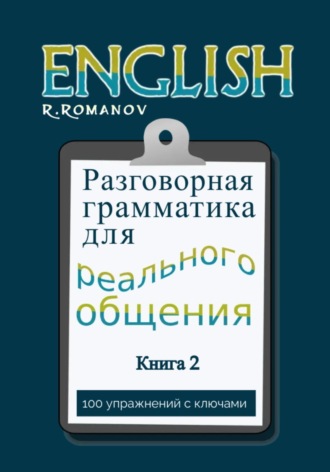
Полная версия
English: Разговорная грамматика для реального общения. Книга 2
5. to have fun – веселиться
6. to have time – располагать свободным временем; не быть занятым
7. to have trouble – испытывать трудности, неприятности
8. to have luck – везти; быть удачливым
9. to have experience – обладать опытом, быть опытным
10. to have knowledge – обладать знаниями, знать
11. to have work – быть занятым работой; работать (= не свободен)
12. to have classes – заниматься (по расписанию)
В других случаях перед существительными всегда используется неопределенный артикль, и эти выражения обычно выражают не только некие действия, но также процессы и события.
1. to have a shower – принимать душ
2. to have a bath – принимать ванну
3. to have a rest – отдыхать
4. to have a break – делать перерыв
5. to have a walk – прогуляться
6. to have a look – взглянуть, посмотреть
7. to have a try – попробовать, дать попытку
8. to have a party – устроить вечеринку
9. to have a good time – хорошо проводить время
10. to have a dream – видеть сон, мечтать
11. to have a baby – родить ребенка
12. to have a smoke – покурить, выкурить сигарету
13. to have a meal – поесть, принять пищу
14. to have a talk – поговорить, побеседовать
15. to have a word – перекинуться парой слов
16. to have a holiday – быть в отпуске, на каникулах
Приведенные выше выражения означают процесс, а не факт обладания, поэтому с ними может употребляться лишь глагол to have, но не have got.
___________
Упражнение 31
Переведите следующие мини-диалоги на русский язык, обращая внимание на употребление неопределенного артикля после глагола to have.
1. Does Anna have breakfast at nine? – Yes, she has breakfast at nine if (если) she doesn’t have classes early. 2. Do they have fun at parties? – Yes, they always have fun – they love dancing. 3. Does Tom have a shower every morning? – No, he doesn’t. He prefers (предпочитает) to have a shower in the evening. 4. When do we have a break? At three? – Ha-ha, dude, we don’t have a break at all – we work straight through (без остановки). 5. Does your brother have classes on Saturday? – No, he doesn’t have any classes – he works at a café. 6. Do you have time to do it on Sundays? – Yes, I do. I don’t have work or classes on weekends. 7. How often do your parents have tea? – My folks (жарг.: родители, «старики») have tea five times a day – it’s their ritual. 8. Do they have a walk in the park after dinner? – Of course, not! It’s too cold now. 9. Where does Sarah usually have a rest? – She usually has a rest on the sofa, she says it’s the only (единственное) quiet place. 10. Do you have a good time at school? – Come on! I don’t have a good time at all! I have too much homework. 11. How many times a year do the students have parties? – They have a party only once – in June, and it’s always so loud! 12. Does your boss have meetings every morning? – No, he doesn’t. He checks (проверяет) emails every morning. 13. What time do you usually have a word with your teacher? – Usually I have a word with her after class, at three sharp. 14. Do they have lunch at the office? – No, they never have lunch at work – they go to a café. 15. Why does Mark have so much experience with cars? – Because he’s worked in a garage for five years. 16. Do you have knowledge of cooking? – No, I don’t have much knowledge – I always burn the food. 17. Who has a smoke outside the bar? – My friends smoke there – but only when it’s warm. 18. Does your grandma have trouble sleeping? – Yes, she does. She wakes up at four every night. 19. Where do you have your afternoon meal? – At work. Usually soup and bread – nothing fancy. 20. Do they have luck in competitions (соревнования)? – No, they don’t have luck – they always come second (вторые). 21. What time does Jake have dinner? – He has dinner at eight – he never eats late. 22. Do we have lessons on Friday? – No, we don’t have lessons – it’s a free day. 23. Where do your neighbours have parties? – They usually have parties in the garden. Everyone comes, even our cat. 24. Does your sister like to have a bath? – No, she never has a bath – she prefers to have a shower. 25. How much time do you have to relax? – I have enough time – work doesn't kill me. 26. Do they have a dream about flying? – No, they don’t have a dream like that – only about food. 27. Why does Tom have work on Sundays? – Because he needs money. 28. Do you have a look at the news every day? – No, I don’t. I’m not into (я не интересуюсь) world news. 29. What kind of trouble do your parents have with IT technology? – They have trouble with passwords – they always forget them. 30. Do we have a talk about the plan tomorrow? – Yes, we have a talk after breakfast – don’t be late.
Упражнение 32*
В устойчивых выражениях с глаголом to have вставьте неопределенный артикль там, где это необходимо.
1. Emma has _____ breakfast at nine in her flat. 2. Do you have _____ classes on Saturday or Sunday? 3. Tom always has _____ shower before work. 4. Where does Sarah have _____ rest during the day? 5. Every Monday we have _____ lunch in the office cafeteria. 6. Does Jake have _____ dinner at eight? 7. My parents have _____ tea every evening in the garden. 8. Do your friends have _____ fun at parties? 9. I need to have _____ break, because my head is spinning (идет кругом). 10. How often do the students have _____ parties in the dorm? 11. She has _____ experience in teaching, so she helps others. 12. Does your brother have _____ work on weekends? 13. We have _____ walk in the park after dinner. 14. Do you have _____ time to meet me at the café? 15. Mark has _____ smoke outside the building at 3 p.m. 16. When do you have _____ meal at work? 17. They have _____ trouble sleeping in noisy cities. 18. Does your grandma have _____ luck in the lottery? 19. I don’t have _____ knowledge of Italian, but I understand some words. 20. How many times a year do they have _____ holiday? 21. He has _____ dream about traveling four times a year. 22. Do we have _____ talk before the meeting? 23. My sister has _____ baby next month, so the whole family is excited (пребывает в волнении). 24. Can I have _____ word with you about the plan? 25. They have _____ fun when they have _____ dinner at Jake’s place. 26. Does Kate have _____ bath every evening? 27. We have _____ lunch at a café near the station. 28. Do your neighbours have _____ party in the garden every summer? 29. After a long working day I have _____ rest on the sofa. 30. She has _____ experience, _____ knowledge, and _____ patience, so she’s perfect for the job. 31. Have _____ look at me, please – are you tipsy (выпивший)?!
Упражнение 33
Ответьте на вопросы, используя устойчивые выражения с глаголом have.
1. Do you have breakfast at home or at work?
2. When do you usually have lunch during the week?
3. Do you have dinner alone or with someone?
4. Do you have tea in the evening, or do you prefer coffee?
5. Do you often have fun on weekends? What do you usually do?
6. Do you have time to relax after work?
7. Do you have trouble waking up in the morning?
8. Do you have luck when you play games?
9. Do you have experience in cooking? Can you make something tasty?
10. Do you have knowledge of another language besides (помимо) English?
11. Do you have work on Sundays, or is it your day off (выходной)?
12. Do you have classes every day, or do you have free days?
13. Do you have a shower in the morning or in the evening?
14. Does your best friend have a bath every day?
15. Where does your sister have a rest when she’s tired?
16. How often does your brother have a break at work?
17. Do you and your friends have a walk in the park together?
18. Can I have a look at your phone, please?
19. Do you always have a try when something seems difficult?
20. Does your roommate often have a party in your flat?
21. Do you have a good time when you go out with your classmates?
22. Does your dad have a dream about retiring (выход на пенсию) early?
23. When does your cousin want to have her first baby?
24. Do you have a smoke when you’re stressed?
25. When do you usually have a meal if you’re not at home?
26. Do you have a talk with your teacher when you have problems?
27. Can I have a word with you about our group project? What time?
28. Does your boss have work on weekends, or does he rest?
29. Do your parents have trouble using smartphones?
30. Do your colleagues have patience when things go wrong at work?
Упражнение 34*
а) Прочитайте и переведите ироничный текст An Ordinary Day in the Life of an Office Worker. Сравните свой перевод с текстом в ключе и скажите, согласны ли вы с тем, как автор перевел историю на русский язык. Если нет, то объясните, почему.
An Ordinary Day in the Life of an Office Worker
Does George have a private life? No – because he works in the office. And people who work in the office don’t have time for a private life. They only have a social life – coffee breaks, team meetings (совещания), and one party a year. The party is in June. No one remembers it – office workers have a short memory.
George has breakfast at eight – coffee and a biscuit, nothing fancy. He doesn’t have time for more. He has work every day from nine sharp to six sharp (sometimes from eight to eight, and those days are really hard). With such a schedule, he has a shower on weekends, not in the morning. “I’m not a morning person,” he says. “I have a dream about sleeping until noon.”
What does the office work mean? It means: pretending (притворяться) to be busy; meetings, emails, reports; coffee breaks, rumors (слухи), love affairs (любовные интрижки) that don’t last long, and resentment (чувство вины) that lasts forever. Anything else? Ah, yes, the salary – so small that it seems to be a joke (or a tragedy).
George has lunch at his desk. Not in the cafeteria. Why? Because he always has trouble with the queue (очередь). And the food? He says it has no taste. “I’d rather have a sandwich and have a rest,” he says. But he never has a rest.
Then, he has a break at three. But only for ten minutes – just enough time to have a smoke outside and have a look at the news. He doesn’t have fun at the office, but he has a lot of fun on weekends. He has a great time with his friends. They have a walk in the park, and sometimes they even have a barbecue in the park. After that they have a word with the police – but that’s another story.
His boss has neither patience nor sympathy (сочувствие). She has meetings all day. “Do we have a talk?” asks George knocking on her office door. “Yes, George, we have a talk – about your report.” Again! George has experience, knowledge, and even luck – but not with reports.
His colleague Jake has a baby next month. Everyone is excited (взволнованы). “When do you have the baby?” they ask though (хотя) they know the answer very well. “We have the baby in July,” Jake says. “And we already have a name: Excel.” George has no idea if he’s joking or being serious.
At six (sometimes eight) p.m., George can finally have a rest. He has dinner at home, has tea, and has a dream about not having work tomorrow. But then his phone rings. “George,” says his boss, “don’t forget that tomorrow we have a meeting at eight sharp!”
After these words George has trouble sleeping. He wakes up every hour and thinks bitterly (горько) that he has absolutely no luck with this groundhog-day («день сурка») life of his.
б) Работа в паре: задайте друг другу по пять специальных вопросов о рабочем дне Джорджа – героя прочитанного текста. В своих вопросах используйте устойчивые выражения с глаголом to have.
Упражнение 35
Используя в качестве модели текст An Ordinary Day in the Life of an Office Worker, расскажите / напишите о своем рабочем / учебном дне, употребив как можно больше устойчивых выражений с глаголом to have для обозначения повседневных действий. В тексте выразите свое отношение к вашему стилю жизни и скажите, что бы вы, возможно, хотели в ней изменить.
Упражнение 36
Переведите на английский язык, используя устойчивые выражения с глаголом to have для обозначения действий и состояний.
1. Эмма принимает душ в 7 утра, даже если (even if) у нее нет работы: она говорит, что это пробуждает душу (soul) – и соседей. 2. Ты завтракаешь дома или пьешь кофе на ходу (on the run)? 3. Том обедает в офисной столовой, но только если очередь маленькая – в противном случае (otherwise) он ест бутерброд из сумки. 4. У моего брата проблемы с пробуждением, поэтому он гуляет каждое утро – до холодильника, а потом обратно в кровать. 5. Сара отлично проводит время на рынках выходного дня (weekend markets). Она разглядывает одежду, веселится с друзьями и иногда даже пьет кофе с незнакомцами (strangers). 6. Каждое лето мы устраиваем вечеринку в саду, но в прошлом году у нас была «беседа» с полицией: музыка была слишком громкой. 7. Твоя бабушка пьет чай каждое вечер? Моя по вечерам пьет чай с печеньем и смотрит детективы. 8. У меня нет времени в будни (weekdays): у меня занятия, работа и кот, который требует внимания (demands attention). 9. Марк выходит покурить после каждой встречи: говорит, что это его единственный (only) шанс подумать. 10. У твоих родителей есть опыт работы с компьютерами? У моих проблемы с подключением к Wi-Fi, и они считают, что «облако» – это опасно (dangerous). 11. Анна делает перерыв в три часа, но всего на пять минут – как раз хватает, чтобы проверить телефон и просмотреть почту. 12. Мы ужинаем в маленьком кафе у вокзала – оно дешевое, шумное, но с лучшим супом в городе. 13. Джейк мечтает бросить (quit) работу и открыть бар в Испании, но сначала ему нужны деньги и храбрость (courage). 14. У моего соседа по комнате скоро будет ребенок, поэтому мы больше не устраиваем вечеринки – теперь только пьем чай и говорим о пеленках (nappies). 15. Ты часто разговариваешь с начальником или избегаешь (avoid) ее, как вируса? 16. Лиза веселится в караоке – у нее громкий голос, уверенность (confidence) и полное отсутствие стыда (zero shame). 17. Мы обедаем на работе, но никогда не делаем это вместе: одни едят салат, другие – бутерброд, а Том поедает шоколад. 18. Мои студенты испытывают трудности с грамматикой, но веселятся на ролевых играх – особенно когда притворяются (pretend) рок-звездами. 19. Твоя сестра отдыхает после работы или сразу идет в спортзал? 20. У меня совещание в девять утра, поэтому я не могу долго завтракать – только кофе и кусок яблочного пирога.
___________
В английском языке существует ряд устойчивых выражений с глаголом to have / to have got, означающих состояние организма во время болезни или симптомы заболевания.
1. to have (got) the flu – болеть гриппом
2. to have (got) a cold – простудиться, быть простуженным
3. to have (got) a fever – испытывать жар
4. to have (got) a high temperature – иметь высокую температуру
5. to have (got) a runny nose – иметь насморк
6. to have (got) a stuffy nose – иметь заложенный нос
7. to have (got) a cough – кашлять
8. to have (got) a sore throat – болеть ангиной
9. to have (got) a headache – испытывать головную боль
10. to have (got) a toothache – испытывать зубную боль
11. to have (got) an earache – испытывать ушную боль
12. to have (got) a stomachache – испытывать боль в животе / желудке
13. to have (got) a backache – испытывать боль в спине
14. to have (got) a rash – покрыться кожной сыпью
15. to have (got) high blood pressure – иметь высокое давление
16. to have (got) cancer – болеть раком
Обратите внимание, что большинство существительных в этих словосочетаниях употребляются с неопределенным артиклем, однако имеются случаи употребления определенного артикля the, а также есть выражения, где артикль отсутствует.
___________
Упражнение 37*
Прочитайте и переведите следующие диалоги, обращая внимание на устойчивые выражения с глаголом to have / have got.
1.
– What’s wrong?
– I’ve got a cold and a runny nose. I feel awful.
– Drink tea with honey and lemon. And have a rest.
2.
– Why are you shivering (дрожишь)?
– I have a fever. My temperature is 39.
– Take medicine, drink water, and stay in bed. No arguments (возражения).
3.
– My throat is killing me.
– You must (должно быть) have a sore throat.
– I know. Can I have soup and stay home?
– Yes. And have a hot drink. No shouting.
4.
– I can’t breathe through my nose.
– You’ve got a stuffy nose.
– Any advice?
– Try steam inhalation (ингаляция с паром). Or just cry – tears help.
5.
– I’ve got a cough that won’t stop.
– Since when?
– Since Monday. It’s worse at night.
– See a doctor. Or try honey before bed.
6.
– My head is pounding (зд.: раскалывается).
– Another headache?
– Yes, and I’ve got a meeting in ten minutes.
– Cancel it. Have a dark room and silence.
7.
– I think I’ve got the flu.
– You look pale (бледный).
– I feel half-dead.
– Stay home. Drink tea, watch series, and suffer in peace.
8.
– My back hurts so much.
– What happened?
– I lifted a box. Now I can’t move.
– Have a hot bath. Or call a chiropractor (костоправ, мануальный терапевт).
9.
– I’ve got a rash on my arm.
– Is it itchy (чешется)?
– Yes, and it’s spreading (зд.: становится больше).
– See a doctor. Or try herbal cream. But don’t scratch (царапать, скрести).
10.
– I’ve got a stomachache again.
– Again? After that spicy curry?
– Yes. And I have trouble sleeping.
– Drink ginger (имбирный) tea. And never eat curry before bed.
Упражнение 38
Отреагируйте на следующие реплики, используя разговорные выражения с to have / have got, означающие состояние и процессы в организме во время болезни. Расширьте свой ответ, добавив какой-нибудь комментарий.
МОДЕЛЬ:
You look so pale! What's wrong with you? (flu) – I've got the flue. My head is pounding!
1. Your cheeks are red, Kate. Why? (fever)
2. Why is Jake coughing so much? (have a smoke)
3. Sarah hasn’t been to work for a week. (flu
Конец ознакомительного фрагмента.
Текст предоставлен ООО «Литрес».
Прочитайте эту книгу целиком, купив полную легальную версию на Литрес.
Безопасно оплатить книгу можно банковской картой Visa, MasterCard, Maestro, со счета мобильного телефона, с платежного терминала, в салоне МТС или Связной, через PayPal, WebMoney, Яндекс.Деньги, QIWI Кошелек, бонусными картами или другим удобным Вам способом.









